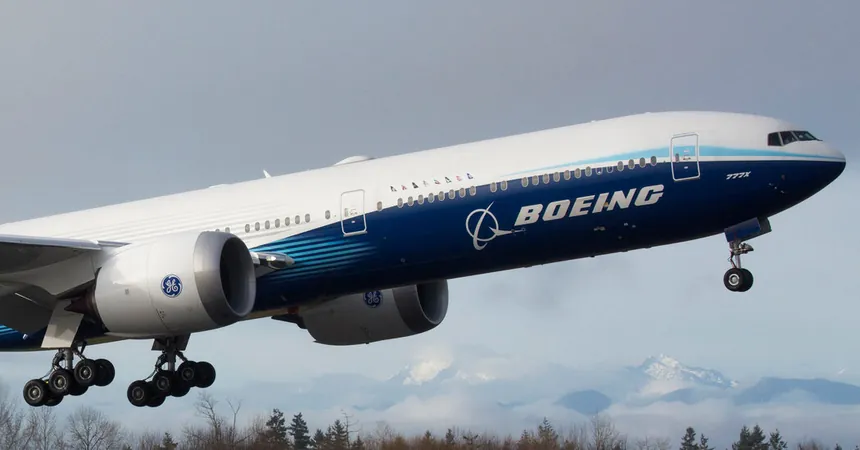
Boeing in Financial Turmoil: Could Bankruptcy Be on the Horizon?
2024-10-15
Author: Kai
Boeing Faces Financial Challenges
Boeing is currently taking significant steps to bolster its financial standing as the aftermath of rising costs and a protracted strike by its largest union continues to unfold.
Plans for Financial Recovery
In regulatory filings released on Tuesday, Boeing revealed its plans to potentially raise up to $25 billion over the next three years through the issuance of debt or stock. Furthermore, the company has secured a $10 billion credit agreement with a consortium of banks, including major players like BofA Securities, Citibank, Goldman Sachs Lending Partners, and JPMorgan Chase—though it has not yet tapped into this funding.
Measures to Maintain Liquidity
These actions are prudent measures aimed at ensuring the company maintains liquidity,” Boeing stated. This comes on the heels of a staggering $5 billion in new costs and an announced restructuring plan, which is set to eliminate 17,000 jobs, amounting to about 10% of its workforce.
Impact of the Strike
The strike, which has now stretched into its second month, is costing Boeing an estimated tens of millions of dollars each day. The majority of the striking workforce is involved in the production of commercial airplanes, effectively halting much of the work, although the assembly of the 787 Dreamliner continues unabated at a nonunion facility in South Carolina.
Negotiations Breakdown
Negotiations between Boeing and the International Association of Machinists and Aerospace Workers, which represents around 33,000 striking employees, broke down recently. Each side has blamed the other for the failure of the talks, particularly after Boeing withdrew its latest contract offer. In an effort to mediate, Julie Su, acting labor secretary, visited Seattle for discussions with both parties.
Financial Implications of the Strike
Financial analysts estimate that the ongoing strike may be costing Boeing approximately $1.3 billion each month. Sheila Kahyaoglu, an analyst at Jefferies, remarked that raising $10 billion through new shares could offer the company 'considerable flexibility' in navigating its financial challenges.
Credit Rating Concerns
The situation has also drawn the attention of credit rating agencies. S&P Global Ratings has indicated that Boeing's credit rating is at risk of being downgraded to junk status, a move that would significantly increase borrowing costs for the aerospace giant. Currently, Boeing's debt stands at nearly $58 billion, a staggering rise from about $9 billion a decade ago.
Struggles Since 2018
Compounding these issues, Boeing has struggled to report annual profits since 2018, following two tragic accidents involving the 737 Max—its flagship aircraft. These incidents not only inflicted hefty financial losses but also severely tarnished the company’s reputation. Concerns surrounding the 737 Max resurfaced earlier this year when a door panel burst open mid-flight on an Alaska Airlines flight, prompting federal investigations and restrictions on production quality improvements.
Industry Concerns About Bankruptcy
Tim Clark, CEO of Emirates, has voiced grave concerns regarding Boeing's future, suggesting that the company might have to consider bankruptcy if it fails to secure additional financing. 'Unless the company can raise funds through a rights issue, I see an imminent investment downgrade with Chapter 11 looming on the horizon,' Clark said.
Investor Reactions
Despite these alarming developments, Boeing’s share price saw a slight increase of about 1% on Tuesday morning—a potential indication of investor speculation amid the ongoing crises.
Conclusion
As the situation continues to evolve, industry watchers are left wondering: will Boeing find a way out of its financial labyrinth, or are darker days ahead?

 Brasil (PT)
Brasil (PT)
 Canada (EN)
Canada (EN)
 Chile (ES)
Chile (ES)
 España (ES)
España (ES)
 France (FR)
France (FR)
 Hong Kong (EN)
Hong Kong (EN)
 Italia (IT)
Italia (IT)
 日本 (JA)
日本 (JA)
 Magyarország (HU)
Magyarország (HU)
 Norge (NO)
Norge (NO)
 Polska (PL)
Polska (PL)
 Schweiz (DE)
Schweiz (DE)
 Singapore (EN)
Singapore (EN)
 Sverige (SV)
Sverige (SV)
 Suomi (FI)
Suomi (FI)
 Türkiye (TR)
Türkiye (TR)